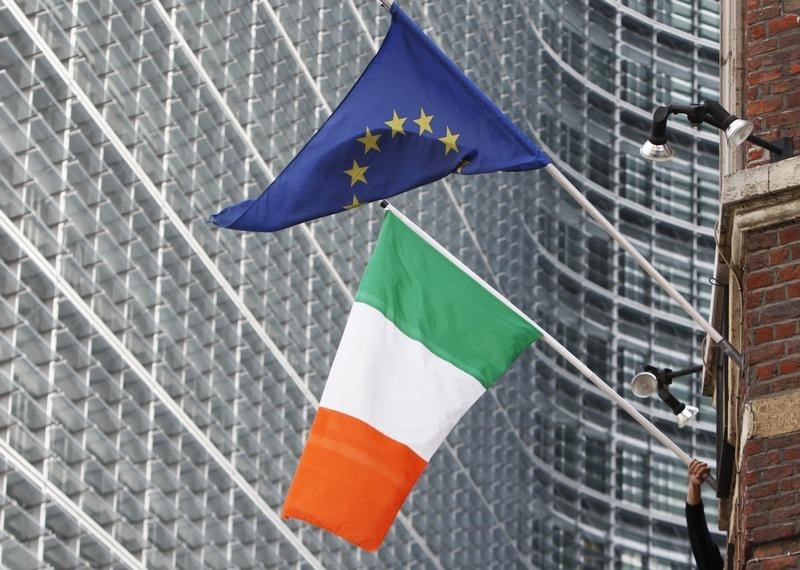By Padraic Halpin
DUBLIN (Reuters) - Ireland could become the latest euro zone country to face political deadlock in an election expected next month that risks delivering an inconclusive verdict and leaving Prime Minister Enda Kenny's coalition short of an overall majority.
Despite boasting Europe's fastest-growing economy and a lead in opinion polls, Kenny's Fine Gael will almost certainly need the support of junior partner Labour to gain re-election - and the pair remain a few percentage points light.
Similar to recent elections in Spain and Portugal that led to no clear victor, unnerving some investors, Irish voters are weighing the impact of an unpopular EU/IMF austerity programme against the start of economic recovery.
As the euro zone slowly emerges from its debt crisis with the help of massive stimulus from the European Central Bank, a wave of political uncertainty that could slow economic reforms adds to a list of problems that include rising euro-scepticism, the migrant crisis and heightened security fears.
Deadlock in Dublin could also put one of Europe's biggest bank floatations since the financial crisis on hold - of state-owned Allied Irish Banks (I:ALBK). And analysts say it could slow crucial decision-making if a government were not in place by the time neighbour and trade partner Britain voted on EU membership.
The uncertainty surrounding the election was typified by a voter who spoke to Fine Gael candidate Noel Rock on her north Dublin doorstep.
"We're disappointed by all the cuts, they have made things extremely hard," she told Rock, referring to her work teaching special-needs pupils which has experienced sharp budget cuts.
The former nurse, who declined to give her name, says she can also sympathise with the "terrible" pay some young public-sector workers face after years of cuts. Another concern is her grown-up son who lives at home and can only find low-paid work.
She is undecided about who to vote for, and Rock - a 28-year-old councillor aiming to win Fine Gael's first seat in the constituency for almost 20 years - believes the "lack of credible alternatives" will swing such voters towards Fine Gael.
The largest opposition party, Fianna Fail, is trailing Fine Gael by over 10 points in some polls after being hammered in the 2011 election - and it says it will not govern with its rivals, especially Sinn Fein, the one-time political wing of the IRA with which it could potentially reach a majority.
"I'm not ready to forgive Fianna Fail and I would be worried and concerned if Sinn Fein were in a position of power," said another voter, 71-year-old pensioner Dan. "I will be voting Fine Gael, I'm generally happy with how things are going."
SPAIN, PORTUGAL
The uncertainty seen so far in countries like Portugal and Spain risk slowing the pace of economic reforms in the euro zone, potentially creating obstacles for growth in high-debt economies seeking to build on fledgling recoveries.
Spain is without a government one month after no party won an outright majority in an election, and political analysts say that if the next administration is a fragile coalition of many parties, it could struggle to agree on a strong reform agenda.
Meanwhile in Portugal, following an inconclusive October election, a shaky alliance of the moderate and far left is struggling to reconcile pledges to end austerity with budget deficit cuts promised to the EU.
In Ireland the recovery is more established and a bout of political stalemate is unlikely to derail an economy that grew by around 7 percent last year and where the jobless rate has fallen to 8.8 percent from over 15 percent in 2012.
But Danske Bank said on Thursday that a "muddled" result could lead to a short-term rise in record low Irish borrowing costs and a postponement of a possible credit rating upgrade by Moody's, the only agency holding Ireland below an 'A' rating.
And the Allied Irish Banks flotation could be affected; the government wants to sell a 25 percent stake but only if re-elected, while the two main opposition parties have said they would not rush to sell the state's shares.
However the main risks to Ireland come from external risks, such as a downturn in the global economy and a possible British exit from the EU, say analysts.
Ireland has more to lose than other EU members in a "Brexit". Trade with its larger neighbour Britain could fall by at least a fifth, according to a government-commissioned report that also flagged "far-reaching consequences" in other areas.
"External factors are the main risk for the Irish economy," said Theresa Reidy, a politics lecturer at University College Cork. "Should they deteriorate and require an unstable government unsure of its majority to take decisive action, that could become a problem."
If Rock gets elected, it could spell a return towards the 36 percent of the national vote Fine Gael captured in 2011. However it would likely be at the expense of Labour, which has borne the brunt of public anger over austerity.
On the most recent polls, the two parties are 13 seats short of the 79 needed for a majority, according to Adrian Kavanagh, a politics lecturer at National University Ireland Maynooth who conducts constituency-level analysis on each survey. Such an outcome could lead to a minority government, a coalition relying on a large number of independent MPs or an election re-run.
"It is looking less and less likely that a combination of Fine Gael and Labour are going to be able to get back into government," said Reidy.
"Unless Labour see some steady improvement in the campaign, which is hard to envisage right now, you'll be left in the quite challenging position where government formation is up in the air. I expect a very uncertain period after the election."
